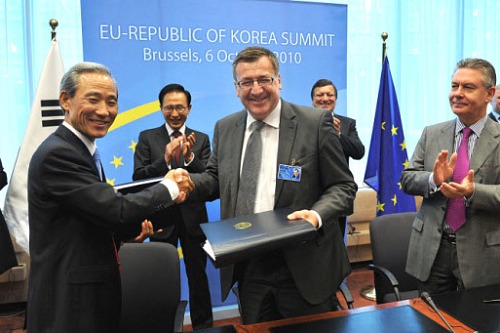한-EU FTA, 세계 거대 시장을 열다
<#302 View of Foreign Press>
South Korea-EU FTA Opens a Giant Market to the World
By Jang Min, Guest Reporter
South Korea and the European Union signed a Free Trade Agreement (FTA) on October 6th. The deal shall take effect on July 1st, 2011 and it will cut billions of dollars in industrial and agricultural duties by lifting tariffs and regulations. Moreover, as the E.U. has been South Korea’s second-largest trading partner, the effect of tariff removal will be enormous. We can expect a 20 percent gain in trade with the E.U., a 5.6 percent increase in Korea’s real gross domestic product. More importantly, Korea became the first Asian country to make an agreement with the world’s largest economic bloc. As the South Korea-EU FTA has attracted the world’s attraction, how does the foreign press respond to this matter?

An article titled “A glimpse of hope on world trade” appeared on the Financial Times in the U.K. on October 6th. It said that the South Korea-EU FTA is a ‘big deal’ in both size and symbolism because it was signed during a time when protectionist sentiment has strengthened and multilateral trade negotiations have stalled. Italy was initially hesitant about the deal because it may threaten its national carmakers and there were worries that the European car industry might be flooded with South Korean cars. However, the Finalcial Times urges the European Parliaments not to waste time in approving the deal.
The Asahi Shimbun on October 8th predicted that the agreement will help South Korean business be more competitive in the EU market. The South Korea-EU FTA also could be a ‘heavy blow to its auto and electronics industry’ as Japan External Trade Organization’s Institute of Developing Economies estimated Japan would lose 3 billion dollars. This response revealed Japan’s unease with regard to the possibility of losing its price competitiveness as South Korea will be free of tariffs as a result of the FTA.
The Wall Street Journal posted an article “Seoul outmaneuvers Tokyo, again” and conveyed Japan’s anxiety over South Korea-EU FTA on October 7th. It focused on the significant negative effects for Japan as Tokyo has dragged its feet on trade pacts, failing to open up its agriculture sector while Korea keeps closer economic ties with the world’s largest market, the E.U., and the U.S. On October 8th, the WSJ criticized the stalled free trade agreement between Korea and the U.S., describing it as a self-defeating policy. The South Korea-U.S. free-trade deal has faced strong opposition by American beef and auto industries.
The view of the foreign press showed that the South Korea-EU FTA has significant implications all around the world. From the perspective of the EU, some have highlighted the positive effect that the FTA encourages not only economic growth but also further trade pacts with other Asian countries. Others pointed out that this agreement threatens Japan because Japan and Korea are competitors in several industries. Additionally, it put pressure on the U.S. to ratify the South Korea-U.S. FTA. Among Koreans, negative effects on vulnerable industries, in particular the dairy industry, have been raised. However, the South Korea-EU FTA has great implications: particularly that Korea has become the preemptive cooperative partner with EU, a organization that is comprised of 27 nations. By making effective programs to compensate for weak industry and preparing to strengthen product competitiveness both in price and quality, Korea will gain full advantage of the free trade agreement as ‘the most ambitious trade pact’.
Jang Min, Guest Reporter
tribune@cnumedia.com

